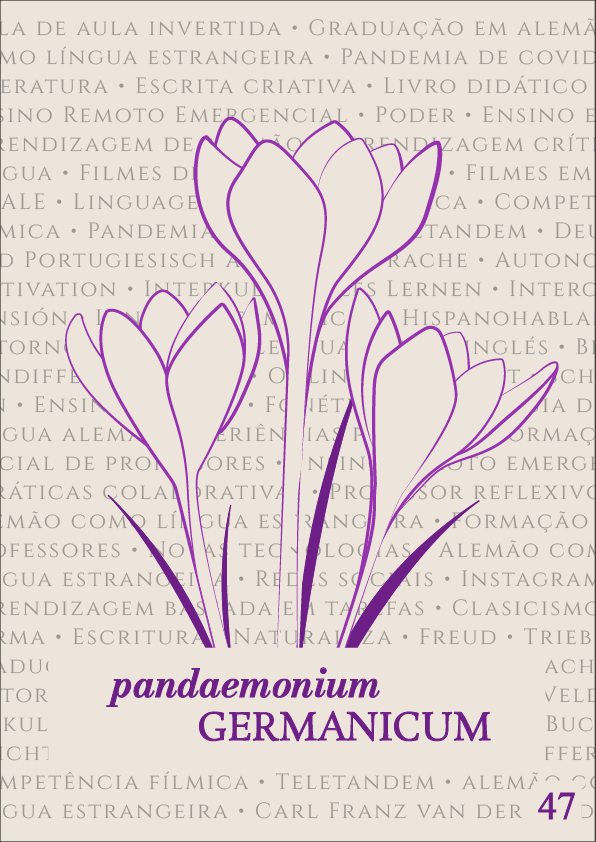The use of social media in German as foreign language classes in a school setting: the-oretical introduction and experience report
DOI:
https://doi.org/10.11606/1982-88372547260Keywords:
German as a foreign language, Social media, Instagram, Task based learningAbstract
This paper aims to report the experience with the “Projekt Deutsch lernen mit Instagram”, carried out with two tenth-grade classes at Colégio Cruzeiro (city of Rio de Janeiro, Brazil) in the first semester of 2021. The project, which consisted on the creation and maintenance of Instagram profiles made for and by German learners, had as main goal to revive the engagement of the students, whose motivation was seriously affected by the limitations imposed by the Covid-19 pandemic. In addition to the description of the project phases and to a reflection on the results achieved, we will be discussing briefly the possibilities and potential challenges of using social networks in foreign language classes according to the studies of Lomicka & Lord (2016) and Würffel (2020), which were used as theoretical basics for the project.
Downloads
References
BARROT, J. S. Social media as a language learning environment: a systematic review of the literature (2008-2019). In: Computer assisted language learning, 2021. Disponível em https://www.tandfonline.com/doi/full/10.1080/09588221.2021.1883673?scroll=top&needAccess=true (03/06/2022).
BZUNECK, J. A. Como motivar alunos: sugestões práticas. In: BORUCHOVITCH, E; BZUNECK, J. A. et al. Motivação para aprender. Petrópolis: Vozes, 2010.
CASTRO, M. H. G. Educação híbrida: renovar o velho processo escolar. [Entrevista concedida a] Paulo de Camargo. Revista educação, n. 276, 18-23, 2021.
ENDE, K; GROTJAHN, R. et al. Modelle für die Unterrichtsgestaltung. In: ENDE, K; GROTJAHN, R. et al, Curriculare Vorgaben und Unterrichtsplanung. Munique: Klett-Langenscheidt, 2013.
FINI, M. I. Educação híbrida: renovar o velho processo escolar. [Entrevista concedida a] Paulo de Camargo. Revista educação, n. 276, 18-23, 2021.
FREITAS, M. C. D., ALMEIDA, M. G. Docentes e discentes na sociedade da informação (A escola no Século XXI; v.2). Rio de Janeiro: Brasport, 2012.
LOMICKA, L; LORD, G. Social networking and language learning. In: FARR, F; MURRAY, L. The Routledge handbook of language learning and technology. Nova Iorque: Routledge, 2016.
LUCKESI, C. C. Segunda constatação: razões da resistência a transitar do ato de examinar para o de avaliar. In: LUCKESI, C. C. Avaliação da aprendizagem: componente do ato pedagógico. São Paulo: Cortez, 2011.
MOYZÉS, M. E. F. et al. In diesem Beitrag erfährst du mehr über Abfallreduzierung in Deutschland und wie du dazu beitragen kannst. Rio de Janeiro, 2021. Instagram: @deutschtipps_ccc. Disponível em: https://www. https://www.instagram.com/p/CQPTCmuMIik/ (29/12/2021).
NAKANO, T. A. A criatividade pode ser medida? Reflexões sobre métodos utilizados e questões envolvidas. Arquivos brasileiros de psicologia, v. 70, n. 1, 128-145, 2018. Disponível em http://pepsic.bvsalud.org/scielo.php?script=sci_arttext&pid=S1809-52672018000100010&lng=pt&nrm=iso (06/04/2021).
NOGUEIRA, N. R. Pedagogia dos projetos. São Paulo: Érica, 2005.
NUNAN, D. Designing tasks for the communicative classroom. Cambridge: Cambridge University Press, 1989.
NUNAN, D. Task-Based Language Teaching. Cambridge: Cambridge University Press, 2004
PAULO, A; GOULART, I. Letramento digital: o professor alfabetizador no contexto das tecnologias digitais. In: ELIEZER et al. A educação em tempos de pandemia. Belo Horizonte: Dialética, 2020.
SAURO, S.; ZOUROU K. Call for papers for CALL in the digital wilds. Language learning and technology, v. 23, n. 1, p. 186.
SCOFANO, V. F.; AGUIAR, D. R.; OLIVA, E. L. Deutsch lernen am besten. Rio de Janeiro, 2021. Instagram: @immer.deutsch_lernen. Disponível em: https://www. https://www.instagram.com/p/CQHNtqOpOrM/ (29/12/2021)
SHAMS, S. Efficacy of online social networks on language teaching: a Bangladeshi perspective. IAFOR Journal of Education, v. 2, n. 2, 117-147, 2014.
SILVA, R. M. S. S.; CAMARA, A. L. C. A. Cadê a galera que faz isso? Ahaha. Rio de Janeiro, 2020. Instagram: @deutschparabrasileiros. Disponível em: https://www.instagram.com/p/CESqupGpCCk/ (29/10/2021).
SOUZA, V. V. S. Letramento digital e formação de professores. Revista Língua Escrita, n. 2, p. 55-69, dez. 2007.
THONHAUSER, I. Was ist neu an den Aufgaben im aufgabenorientierten Fremdsprachenunterricht? Einige Überlegungen und Beobachtungen. Babylonia: revue pour l'enseignement et l'apprentissage des langues, v. 3, 8-16, 2010.
TRAUB, S. Projektarbeit erfolgreich gestalten. Bad Heilbrunn: Julius Klinkhardt, 2012
WÜRFFEL, N. Soziale Medien im Deutsch-als-Fremdsprache-Unterricht: Potenziale und Herausforderungen. In: MARX, K; LOBIN, H. et al. Deutsch in Sozialen Medien: Interaktiv – multimodal – vielfältig. Berlin: De Gruyter, 2020.
Downloads
Published
Issue
Section
License
Copyright (c) 2022 Pandaemonium Germanicum

This work is licensed under a Creative Commons Attribution-NonCommercial-NoDerivatives 4.0 International License.



